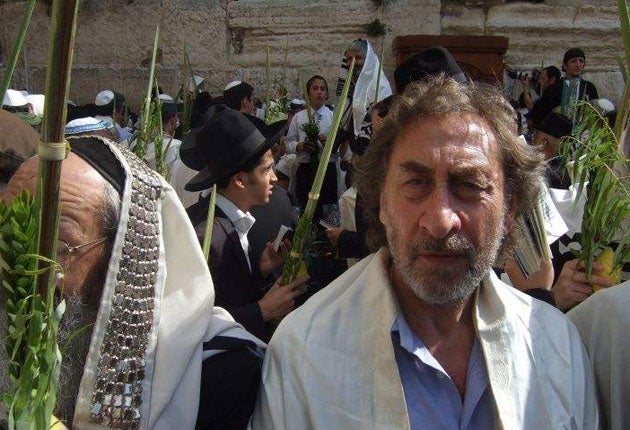Countdown, Channel 4<br>A History of Christianity, Channel 4<br>Could You Eat an Elephant? Channel 4
Jesus revisited by a 21st-century writer was a high point – unlike the return of a teatime institution

Your support helps us to tell the story
From reproductive rights to climate change to Big Tech, The Independent is on the ground when the story is developing. Whether it's investigating the financials of Elon Musk's pro-Trump PAC or producing our latest documentary, 'The A Word', which shines a light on the American women fighting for reproductive rights, we know how important it is to parse out the facts from the messaging.
At such a critical moment in US history, we need reporters on the ground. Your donation allows us to keep sending journalists to speak to both sides of the story.
The Independent is trusted by Americans across the entire political spectrum. And unlike many other quality news outlets, we choose not to lock Americans out of our reporting and analysis with paywalls. We believe quality journalism should be available to everyone, paid for by those who can afford it.
Your support makes all the difference.Moustachioed master Derren Brown last week revived the finest traditions of "psychic" showmanship. Howard Jacobson delivered a stirring essay on a man he described as "one of the greatest" Jewish teachers – Jesus (Channel 4's typically contrary start to its history of Christianity).
Two chefs went round the world eating the most macho food they could find, while Evan Davis told us why banks bust and ... what do you mean, where were the women?
Why, a new young blonde female appeared in TV's most Stepford Wifely role, serving up numbers, vowels and consonants on Countdown. Did you not admire the hostessy bobtail motion of her bottom? Richard Whiteley died and Carol Vorderman got within shouting distance of 50, so Channel 4 decided to start over with as close a replica of their glory days as possible. Except in 2009 the dynamic is a lot less palatable. New appointee Rachel Riley is clever and lovely, but there's something wrong with TV when it puts her in that horrible little pen, pairs her inexperience with the paternal authority of Jeff Stelling and calls it the strongest female appointment of the year.
Anyway, fan as I am of Howard Jacobson, I had never before thought to compare him with Jesus. But his polemic "Jesus the Jew" tacitly invited you to consider that Christ must have looked a lot more like him than, say, Derren Brown or the faces usually seen in Western iconography. A History of Christianity – Jesus the Jew, Jacobson's programme, was great TV: a script composed with attitude and an outstanding ear for rhythm and rhetoric. Ten years ago he made a facetious programme about Judas; this was a mature return to the subject, tightly strung, braced with the power of saying, very carefully, what is usually unsaid: "Make no mistake, for some Christians, the Holocaust was payback time." At home, the Jacobsons "feared the cross as any vampire might".
Although his prime self-identity here was his Jewishness (and perhaps his clarity of vision came from being "convinced, but not practising"), his other minority identity also informed this piece: his novelist's eye. He described Jesus as "a man extraordinary for the dark riddling powers of his expression, for the magnificently scornful sweep of his mind...". When describing how Jesus went to teach in Capurnaum, Jacobson added that "no man is a prophet in his home town". The millennia between Him and us momentarily vanished. Novelists are always welcome on my TV. The next instalments come from familiar media ponies: Michael Portillo, Cherie Booth. Let us see if they can match Jacobson, whose final appeal for inter-faith understanding – "Acknowledge it ... it is Jewishness you are honouring whenever you speak Jesus's words!" – was a powerful sequence despite the fact that, in immediate political terms, it was a furious attempt to calm a lull. Judaeo-Christian relations aren't the problem just now.
"When we're increasingly worried about the ethics of mass food production, shouldn't we be looking for greater variety in what we put on our plate?" asked the smug, stupid voiceover on Could You Eat an Elephant?, using an exhausting litany of sophistries to justify two blokes heading off round the world on an extended bushtucker trial. The idée fixe of the maddening voiceover was that we should try to "learn something" from the example of people who, in their need for protein, and due to cultural and environmental specificities – which the programme ignored – consume beetle, rat and dog. It was a confused exercise in relative values, part-freak show, part-patronising lecture.
Fergus Henderson and Jeremy Lee, the show's likeable chefs, seemed unaware of what the producer was up to. Served cobra and chips in Vietnam, Lee chewed tentatively. "I have to say," he ruminated, "it's fresh as a daisy!" Henderson's ebullient character and battle with Parkinson's make him a brilliantly idiosyncratic TV presence, adding gestures and sound effects to every verdict. On dog's intestine, served cold: "There's a ... nee-naw-nee-naw fattiness to it."
With more of them and less of the moronic voiceover, this could have been worthy of a series. As it turned out, it was, as Jeremy Lee said of mongrel stew, best kept "a singular event".
Join our commenting forum
Join thought-provoking conversations, follow other Independent readers and see their replies
Comments